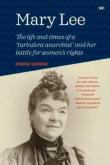 3187295955755524675.jpg
3187295955755524675.jpg
 Mary Lee : The Life and Times of a 'Turbulent Anarchist' and Her Battle for Women's Rights
single work
Mary Lee : The Life and Times of a 'Turbulent Anarchist' and Her Battle for Women's Rights
single work
 3187295955755524675.jpg
3187295955755524675.jpg
 Mary Lee : The Life and Times of a 'Turbulent Anarchist' and Her Battle for Women's Rights
single work
Mary Lee : The Life and Times of a 'Turbulent Anarchist' and Her Battle for Women's Rights
single work
''I hope Mrs Lee will forgive me indicating that in my youthful opinion she is a turbulent anarchist.' Young South Australian, 1893
'Suffragist and social justice advocate Mary Lee was determined to leave the world a better place than she found it. The feisty 59-year-old widow, of limited means and with few family and friends, settled in Adelaide in 1879 and immediately set to work.
'Undaunted by the opposition of antagonistic politicians and a conservative public, Mary thrust herself into high profile campaigns in support of female refuge, improving women's working conditions and gaining women's suffrage. In 1894, South Australia became the first place in the world to pass legislation giving women the right to vote and be elected members of parliament, thanks in no small part to Mary Lee's energy and committed determination.
'The disappearance of Mary Lee's journals and most of her letters, along with a dearth of recorded women's history, kept her contribution to history hidden for more than 125 years. Undeterred, author Denise George travelled to Ireland and her painstaking examination of local records both there and in Adelaide revealed the compelling story of a woman who took on the Establishment, and won.' (Publication summary)
'When tasked with teaching a class on South Australian women's suffrage some years ago, Catherine Helen Spence was the name I associated most with the campaign. What did I know about Mary Lee? Only that she was a mother of limited means. Thankfully, I had Susan Magarey's wonderfully readable Passions of the First Wave Feminists (2001), which devotes four pages to Lee's work, but it was still difficult to get a handle on who Lee was. Magarey included Spence's observation, on the eve of the crucial vote in 1894, that Lee seemed ‘miffed that she, Spence, should be gaining so much attention in this moment, a moment for which Mary Lee has campaigned with all her considerable skills and energy’. In 1986, Helen Jones remarked in the Australian Dictionary of Biography that Lee's work had gone unrecorded until 1980. It seems in death she was overshadowed by Spence, as she had been at crucial moments in the life of the suffrage campaign.' (Introduction)
'When tasked with teaching a class on South Australian women's suffrage some years ago, Catherine Helen Spence was the name I associated most with the campaign. What did I know about Mary Lee? Only that she was a mother of limited means. Thankfully, I had Susan Magarey's wonderfully readable Passions of the First Wave Feminists (2001), which devotes four pages to Lee's work, but it was still difficult to get a handle on who Lee was. Magarey included Spence's observation, on the eve of the crucial vote in 1894, that Lee seemed ‘miffed that she, Spence, should be gaining so much attention in this moment, a moment for which Mary Lee has campaigned with all her considerable skills and energy’. In 1986, Helen Jones remarked in the Australian Dictionary of Biography that Lee's work had gone unrecorded until 1980. It seems in death she was overshadowed by Spence, as she had been at crucial moments in the life of the suffrage campaign.' (Introduction)